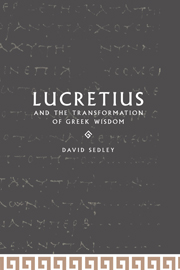Book contents
- Frontmatter
- Contents
- Preface
- Introduction
- Chapter 1 The Empedoclean opening
- Chapter 2 Two languages, two worlds
- Chapter 3 Lucretius the fundamentalist
- Chapter 4 Epicurus, On nature
- Chapter 5 Lucretius' plan and its execution
- Chapter 6 The imprint of Theophrastus
- Chapter 7 The transformation of book I
- Epilogue
- Bibliography
- Index locorum
- General index
- Index of modern scholars
Chapter 2 - Two languages, two worlds
Published online by Cambridge University Press: 22 September 2009
- Frontmatter
- Contents
- Preface
- Introduction
- Chapter 1 The Empedoclean opening
- Chapter 2 Two languages, two worlds
- Chapter 3 Lucretius the fundamentalist
- Chapter 4 Epicurus, On nature
- Chapter 5 Lucretius' plan and its execution
- Chapter 6 The imprint of Theophrastus
- Chapter 7 The transformation of book I
- Epilogue
- Bibliography
- Index locorum
- General index
- Index of modern scholars
Summary
LINGUISTIC POVERTY
In the preceding chapter, we met at the end of Lucretius' proem his famous apology on behalf of the Latin language (1136–45), in which helaments the linguistic struggle that he faces (1136–9):
nec me animi fallit Graiorum obscura reperta
difficile inlustrare Latinis versibus esse,
multa novis verbis praesertim cum sit agendum
propter egestatem linguae et rerum novitatem.
Nor do I fail to appreciate that it is difficult to illuminate in Latin
verse the dark discoveries of the Greeks, especially because much use must be made of new words, given the poverty of our language and the newness of the subject matter.
In §§2–7 of this chapter I shall be considering how he handles this task of Latinising the technical terms of Epicurean philosophy. In §§8–13 Ishall turn to his own poetic use of Greek loan-words and idioms. The two practices will come out looking antithetical to each other. At the end I shall suggest how we are meant to interpret this antithesis. What may start out looking like an issue of linguistic mechanics will turn out, if I am right, to reveal a fundamental tension in Lucretius' evaluation of his own poetic and philosophical task.
- Type
- Chapter
- Information
- Lucretius and the Transformation of Greek Wisdom , pp. 35 - 61Publisher: Cambridge University PressPrint publication year: 1998



